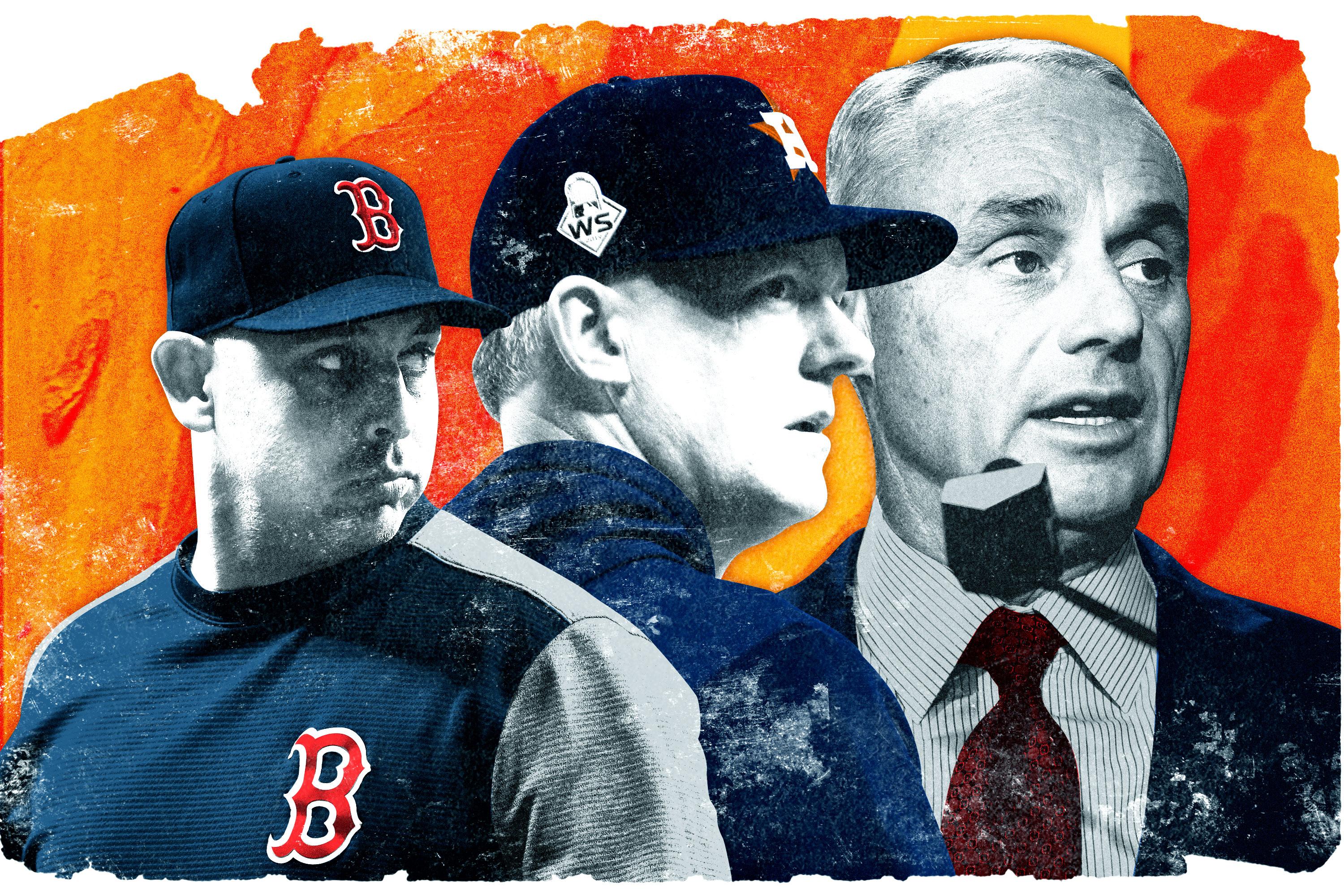
Two months ago, a bombshell Athletic report accused the 2017 Astros, via then–team member Mike Fiers, of illicitly stealing signs. On Monday, MLB issued its response, and the club’s discipline, broadly speaking, forms a bit of a Rorschach test.
Did you trust commissioner Rob Manfred to hold the Astros accountable, in the name of integrity? Then you probably see the one-season suspensions of GM Jeff Luhnow and manager A.J. Hinch; the loss of first- and second-round draft picks in consecutive years; and a $5 million fine—the maximum amount allowed—as a just and harsh punishment.
Conversely, were you cynical and suspicious, assuming there would be no way to properly levy a commensurate punishment, given that the Astros won the 2017 World Series and nothing could take away the memories and joy of that title? Then you probably think that the suspensions aren’t overly harsh (Luhnow wouldn’t have even missed an offseason); that the draft pick losses are painful but not prohibitive (the Astros would probably have picked at the bottom of the rounds anyway); and that the fine amounts to chump change given the franchise’s tremendous value. That the most severe fallout on Monday—Houston’s subsequent firing of Luhnow and Hinch—came not from MLB itself but from Astros owner Jim Crane would seem to reinforce this idea.
Or you might feel entirely differently, falling somewhere along the spectrum between those responses. (Some rival executives, it’s worth noting, appear to hew toward the latter.) Those responses will be fodder for debate for weeks to come, with MLB making the announcement midday on a Monday for prime discussion, rather than dumping the news last Friday afternoon. Along with the announcement of the punishments, Manfred also issued a nine-page report summarizing the results of the investigation into the club, which comprised interviews with 68 witnesses and assessments of tens of thousands of written messages, photos, and video clips. Here are nine key takeaways from the report.
1. The “Banging Scheme,” as Manfred’s report terms it, evolved over time
To review, The Athletic’s November story outlined the Astros’ mix of high- and low-tech sign stealing as follows: A camera set up in center field would broadcast to a video monitor in the hallway behind the home dugout, allowing players to watch and warn their teammates, with a bang on a trash can, about which type of pitch was en route. As Manfred’s report summarizes, “Generally, one or two bangs corresponded to certain off-speed pitches, while no bang corresponded to a fastball.”
However, this scheme, which began about two months into the 2017 season, did not represent the club’s first effort to use electronics in real time to steal signs. The report notes that at the start of that season, when a runner stood on second base, the Astros used a live feed in their replay review room to decipher a catcher’s signs, which they could then transmit to the dugout, then the runner, and finally the batter at the plate. Sometimes, the report says, the information would travel from the replay room to the dugout via text message.
Compared to the ultimate “Banging Scheme,” this process seems cumbersome, time-consuming, and less useful. It involved four separate stages and could only function with a runner on second base. The trash can ploy, conversely, could theoretically work in just two stages—camera to player, via a monitor; player to teammate at the plate, via a whack—and on every pitch.
2. That scheme extended through the postseason
The initial Athletic report was conflicted on this matter, noting, “Two sources said the Astros’ use of the system extended into the 2017 playoffs. Another source adamantly denied that, saying the system ended before the postseason.”
MLB’s investigation confirms that the Astros continued to steal signs in this manner through the playoffs—which, of course, saw Houston win the first World Series title in franchise history, after seven-game wins over the Yankees and Dodgers. Nobody tell Crane how these two facts might be connected.
3. Manfred had effectively given the Astros a chance to avoid detection and punishment, and they didn’t take it
Back in August 2017, tech-aided sign stealing entered the baseball conversation when the Red Sox were caught using smart watches to communicate in the dugout, against league rules. At the time, Manfred fined Boston (and the Yankees, for a related misuse of the replay review room phone) and, as he reiterates in Monday’s report, warned all 30 teams in a memo about their potential conduct going forward.
“I specifically stated in the memorandum that the General Manager and Field Manager of Clubs would be held accountable for any violations of the rules in the future,” he writes. “Thus, all Clubs were put on notice as of September 15, 2017 that any use of electronic equipment to steal signs would be dealt with more severely by my office.”
Houston ignored this warning, thus triggering the more severe punishments, specifically to the GM and manager that Manfred explicitly mentioned about two years prior.
4. Take note: Banging is preferable to other forms of communication
Here’s a wacky parenthetical from the report: “Witnesses explained that they initially experimented with communicating sign information by clapping, whistling, or yelling, but that they eventually determined that banging a trash can was the preferred method of communication.”
Someone needs to uncover everything about the meeting in which this determination took place. Did the Astros run scientific tests? Did they control for confounding variables? The people demand answers.
5. It’s unclear whether the scheme actually worked
Here, the anonymous players interviewed by MLB seem to confirm public analysis, which has questioned just how valuable the stolen signs proved. Although “most of the position players” on the team participated in the practice and received this information while batting, per Manfred’s report, “some Astros players told my investigators that they did not believe the sign-stealing scheme was effective, and it was more distracting than useful to hitters.”
Furthermore, while the investigation learned that the Astros did not continue banging trash cans in 2018, it reveals that they did continue using the replay room’s video to decode and transmit catcher signs. However, they ceased this practice midway through the year because “the players no longer believed it was effective.”
6. Astros players were at least somewhat concerned about getting caught … so they grew more secretive instead of stopping
Manfred’s report notes that “many of the players who were interviewed admitted that they knew the scheme was wrong.” Still, when they were almost caught—by White Sox reliever Danny Farquhar, who figured out what was happening while pitching against Houston—the close call didn’t lead to a change of heart.
Instead, the report details, “there was a sense of ‘panic’ in the Astros’ dugout” that day. Before the game ended, a group of players had taken the monitor off the tunnel wall and hidden it, replacing it in the playoffs with a “portable monitor” to, presumably, avoid potential detection more easily.
Even though he acknowledged this subterfuge, Manfred spared the players any punishment because of his precedent in 2017, when he announced specifically that he’d hold GMs and managers culpable in such an event. He notes further that “discipline of players for this type of conduct is both difficult and impractical” because of the impossibility of determining precisely how each player participated in the scheme.
7. Hinch attacked a TV, twice
Although Manfred suspended Hinch because the Houston manager did not stop his charges from engaging in impropriety, the report indicates that Hinch expressed his opinion internally in quirky fashion. “He believed that the conduct was both wrong and distracting,” it reads. “Hinch attempted to signal his disapproval of the scheme by physically damaging the monitor on two occasions, necessitating its replacement.”
Could he have used his words to tell his players to stop? Maybe! (And if the report is to be believed, this would have worked: “Players stated that if Manager A.J. Hinch told them to stop engaging in the conduct, they would have immediately stopped.”) Instead, he chose to take his frustration out on the monitors themselves. This is why clear and healthy communication is important.
8. The same qualities that helped propel the Astros to victory were the basis for their undoing
The most forceful section of the report sees Manfred convey his “general observations regarding the Astros’ baseball operations department,” which tie together both interviews about this scandal and those about the dismissal of former assistant GM Brandon Taubman after his derogatory conduct during a 2019 playoff celebration. (In this report, Manfred also placed Taubman on the ineligible list through the 2020 World Series.)
In this section, Manfred wrestles with the very questions that have plagued the broader baseball world of late: Luhnow, he writes, is “widely considered to be one of the most successful baseball executives of his generation,” having built a “perennial Postseason contender” and “an industry leader in its analytics.” Yet at the same time, the organization he oversaw produced a “very problematic” culture, “manifesting itself in the way its employees are treated, its relations with other Clubs, and its relations with the media and external stakeholders.” Ultimately, Manfred writes, the club’s baseball operations structure allowed both sides—the positives and negatives, the profit and the poison—to flourish simultaneously.
9. This saga isn’t over—Alex Cora’s punishment is coming, and it will be severe
Cora, Houston’s bench coach in 2017 and Boston’s manager beginning in 2018, was not disciplined in this round. That’s because MLB is still investigating yet another claim of tech-aided sign stealing, from the 2018 World Series–winning Red Sox, and Manfred wrote that he’d withhold an announcement on Cora’s punishment until that matter concludes.
Based on the information that appears in this report, however, Cora should expect a one-season suspension like Luhnow and Hinch received—at a minimum. His name appears 11 times in the report, more than once per page, and he is singled out as the lone nonplayer directly involved in the scheme.
Cora, the report says, oversaw the installation of the video monitor in the hallway behind the dugout, to receive the camera feed from center field. He also served as the middleman between the replay room and dugout in the secondary sign-stealing effort. The report states, “Cora was involved in developing both the banging scheme and utilizing the replay review room to decode and transmit signs. Cora participated in both schemes, and through his active participation, implicitly condoned the players’ conduct.” This direct wording comes in the same section that the report (partially) exonerates Luhnow and Hinch, yet they received the lengthy suspension anyway.
According to The Athletic, the only managerial suspension in history longer than one season was Pete Rose’s lifetime ban for gambling on the sport. All indications are that Cora’s punishment will be more severe than Hinch’s—so either he’ll be banned for good, like Rose, or tread an unprecedented middle ground. Astros owner Crane might think, as he said in a press conference Monday, that the scandal is “behind us.” But from baseball’s perspective, this sort of reckoning has a long way to go.

